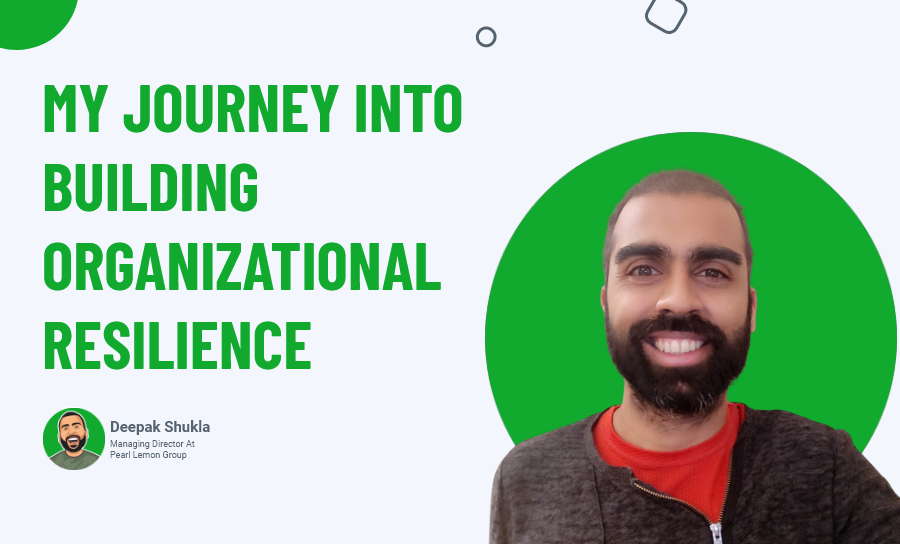Morning guys,
![]()
Today’s an important day as it marks the 2nd day of my journey of trying to build organizational resilience within Pearl Lemon.
It’s my first week ever where I’m trying to (in a modified manner) – step out of day to day runnings of Pearl Lemon.
It’s as scary as hell.
But let me begin by briefly explaining what organizational resilience actually is (at least in my mind):
It’s the ability of a company to become resilient and successful in the face of adversity or rapidly changing situations and use a set of operating rules to make quick decisions for the betterment of the company.
In some ways, it’s like improvisation with the use of a couple of ground rules.
Sounds straightforward enough but when you introduce the complexities of doing great work for demanding clients than it becomes a lot more complicated.
When you are trying to step out of day to day runnings of your own business than something like this comes much more heavily to the fore –
With this in mind, there’s a couple of things I think become practical when thinking about building resilience.
I’ve had a brief look at the academic literature from Denyer on this in his work on Organizational resilience and I want to offer my interpretations of some of the tenets of this – and how I’m trying to instil this at Pearl Lemon.
This is all in relation to fostering resilience in organizations.
The first consideration – is that by pulling myself out of the day to day runnings of the business – the business is definitely going to be tested.
Dennis talks about prioritizing reliability – and this is that something can go wrong is a consideration in planning, decision making and day to day activities.
This is bound to happen when I’m not around on a day to day basis as is the case this week.
And in even planning to be away you start to introduce new lines of communication between the team and more interdependency and reliances that don’t form solely around key persons.
In this way, you begin to make the organisation stronger.
Recognizing Complexity is something that Denyer speaks about – and therefore having diverse opinions can help recognize and incorporate new aspects…
For me, this isn’t a mission-critical part of building resilience.
It’s the next part that is most important to the process.
Table of Contents
Building Strong And Resilient Leaders

This is for me the most critical part of building a resilient organization. It’s the leaders within the team and how well they can adjust to fast-changing environments.
Let’s talk briefly about what this process at Pearl Lemon looks like.
Well – leaders, in many respects make themselves known. It’s a natural part of the hiring process that you do find people that step up to the plate when it comes to taking on more responsibility.
In combination with this – it’s critical to give these leaders the best training possible.
Initially – I believe that training needs to come from within – i.e it needs to come from yourself if you’re the leader so you can communicate your leadership values and skills.
When you’re a company of <50 people – often time it’s said that the company is a reflection of its founder’s values and principles until it grows until something all by itself.
From my experience this is true.
Here’s what I’m doing to help foster strong leadership:
- Identified leaders and have expressed my plans to step away for one week
- Bought them all together into a group
- In preparation leading up to this moment I’ve begun doing leadership training for several weeks in our training sessions
- Asked that they all watch the leadership training videos and comment upon them
- Asked them collectively what they need from me
- Figured out who they can ask instead
- Introduced them to each other so they’re more aware of the other people in our remote team
- Conducting 1-on-1 training with several of them to work on account management skills
I think that no matter what is the outcome of this week away – there’ll be good things that come from it – here are some I’ve already identified as a consequence of myself stepping back:
- I’ve had the opportunity to give detailed feedback to my sales team on their calls
- Provided training on how to improve their pitching
- Will build out some training materials for them to fall back upon
- I will build out my sales script
- Have shared a series of training videos on SEO for the new potential account managers within Pearl Lemon to up their SEO knowledge
- Taking one of my best ‘people person’s’ and asking them to test all others on their account management and people management skills
- Building in more due diligence internally so that people can fall back on processes
- Those who know due diligence is being run, automatically resist it (which tells me something is awry) – but ultimately it forces them to pick up their game and creates more accountability
Allowing Your Team To Make Mistakes

This is a critical part of building resilience as an organization – letting others know that it’s ok to make mistakes and that as long as we learn from our missteps and improve – we will only keep getting better.
[convertful id=”197358″]
I’ll break down some other learnings at a more practical level as I have above.
This is the way I find the theory actually makes sense:
- I’m also asking the team to document each time challenges come up so we can keep a record of it and build out a procedure for those instances
- Running rapid-fire tests – this is what I’m doing with these few days away so that my team can step up to the plate – once we do this, this week – we will try again and again and again until I am no longer needed
- Working as quickly as you can to resolve challenges that come up within the team
Having strong fundamentals in place is also critical as you think about resilience.
What I mean by this is – do you have heads of staff? Do you have a predictable pipeline? Do you generally deliver? Is your retention good?
Separate your emotion from this journey

Doing this will enable you to understand – where is the company weak? What functions need dramatic improvement?
As you really think about this – it should become apparent to you where the company needs to build more strength and ability to resist.
For example – in my instance – I’m heavily involved in account management and bringing in deals – these are definite weaknesses in the business that make us the opposite of resilient
Don’t get me wrong there are 1001 other problems but working on the biggest wons are spaces that will produce the biggest return.
The Law Of Marginal Improvements

I might do an entire blog post on this – but there’s a lot to be said for making marginal improvements continuously within all of your work.
All the small changes add up to big improvements with your business. So as you find opportunities for change – keep changing things. And over time all of those quick wins will = huge resilient returns!
Final Thoughts

Organizational resilience is something that every company should run towards and in many respects is the outcome of a turbulent period of stepping back as one of the major people within the team and allowing other people to step up.
Just by virtue of doing this, you’ll see movement and progress.
Here’s to your resilient success!



